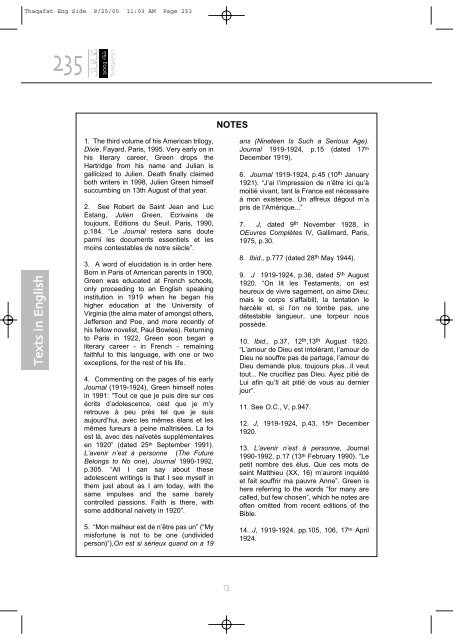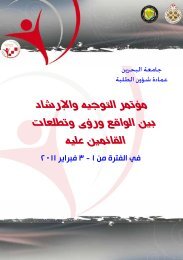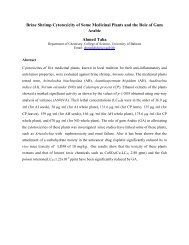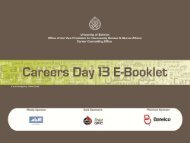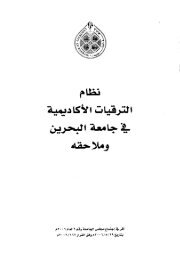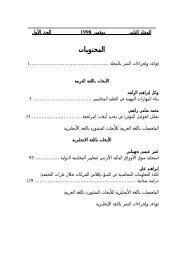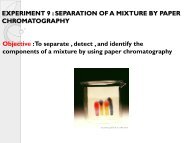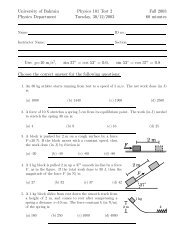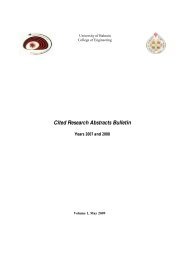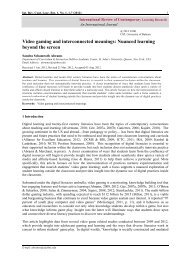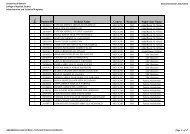Create successful ePaper yourself
Turn your PDF publications into a flip-book with our unique Google optimized e-Paper software.
Thaqafat Eng Side 8/25/05 11:03 AM Page 253<br />
&%!<br />
ثقافات<br />
شتاء %##&<br />
THAQAFAT<br />
Texts in English<br />
1. The third volume of his American trilogy,<br />
Dixie, Fayard, Paris, 1995. Very early on in<br />
his literary career, <strong>Green</strong> drops the<br />
<strong>Hartridge</strong> from his name and <strong>Julian</strong> is<br />
gallicized to Julien. Death finally claimed<br />
both writers in 1998, Julien <strong>Green</strong> himself<br />
succumbing on 13th August of that year.<br />
2. See Robert de Saint Jean and Luc<br />
Estang, Julien <strong>Green</strong>, Ecrivains de<br />
toujours, Editions du Seuil, Paris, 1990,<br />
p.184. “Le Journal restera sans doute<br />
parmi les documents essentiels et les<br />
moins contestables de notre siècle”.<br />
3. A word of elucidation is in order here.<br />
Born in Paris of American parents in 1900,<br />
<strong>Green</strong> was educated at French schools,<br />
only proceeding to an English speaking<br />
institution in 1919 when he began his<br />
higher education at the University of<br />
Virginia (the alma mater of amongst others,<br />
Jefferson and Poe, and more recently of<br />
his fellow novelist, Paul Bowles). Returning<br />
to Paris in 1922, <strong>Green</strong> soon began a<br />
literary career - in French - remaining<br />
faithful to this language, with one or two<br />
exceptions, for the rest of his life.<br />
4. Commenting on the pages of his early<br />
Journal (1919-1924), <strong>Green</strong> himself notes<br />
in 1991: “Tout ce que je puis dire sur ces<br />
écrits d’adolescence, cest que je m’y<br />
retrouve à peu près tel que je suis<br />
aujourd’hui, avec les mêmes élans et les<br />
mêmes fureurs à peine maîtrisées. La foi<br />
est là, avec des naïvetés supplémentaires<br />
en 1920” (dated 25 th September 1991).<br />
L’avenir n’est à personne (The Future<br />
Belongs to No one), Journal 1990-1992,<br />
p.305. “All I can say about these<br />
adolescent writings is that I see myself in<br />
them just about as I am today, with the<br />
same impulses and the same barely<br />
controlled passions. Faith is there, with<br />
some additional naivety in 1920”.<br />
5. “Mon malheur est de n’être pas un” (“My<br />
misfortune is not to be one (undivided<br />
person)”),On est si sérieux quand on a 19<br />
NOTES<br />
ans (Nineteen Is Such a Serious Age).<br />
Journal 1919-1924, p.15 (dated 17 th<br />
December 1919).<br />
6. Journal 1919-1924, p.45 (10 th January<br />
1921). “J’ai l’impression de n’être ici qu’à<br />
moitié vivant, tant la France est nécessaire<br />
à mon existence. Un affreux dégout m’a<br />
pris de l’Amérique...”<br />
7. J, dated 9 th November 1928, in<br />
OEuvres Complètes IV, Gallimard, Paris,<br />
1975, p.30.<br />
8. Ibid., p.777 (dated 28 th May 1944).<br />
9. J 1919-1924, p.36, dated 5 th August<br />
1920. “On lit les Testaments, on est<br />
heureux de vivre sagement, on aime Dieu;<br />
mais le corps s’affaiblit, la tentation le<br />
harcèle et, si l’on ne tombe pas, une<br />
détestable langueur, une torpeur nous<br />
possède.<br />
10. Ibid., p.37, 12 th ,13 th August 1920.<br />
“L’amour de Dieu est intolérant, l’amour de<br />
Dieu ne souffre pas de partage, l’amour de<br />
Dieu demande plus, toujours plus...il veut<br />
tout... Ne crucifiez pas Dieu. Ayez pitié de<br />
Lui afin qu’Il ait pitié de vous au dernier<br />
jour”.<br />
11. See O.C., V, p.947.<br />
12. J, 1919-1924, p.43, 15 th December<br />
1920.<br />
13. L’avenir n’est à personne, Journal<br />
1990-1992, p.17 (13 th February 1990). “Le<br />
petit nombre des élus. Que ces mots de<br />
saint Matthieu (XX, 16) m’auront inquiété<br />
et fait souffrir ma pauvre Anne”. <strong>Green</strong> is<br />
here referring to the words “for many are<br />
called, but few chosen”, which he notes are<br />
often omitted from recent editions of the<br />
Bible.<br />
14. J, 1919-1924, pp.105, 106, 17 th April<br />
1924.<br />
"&


